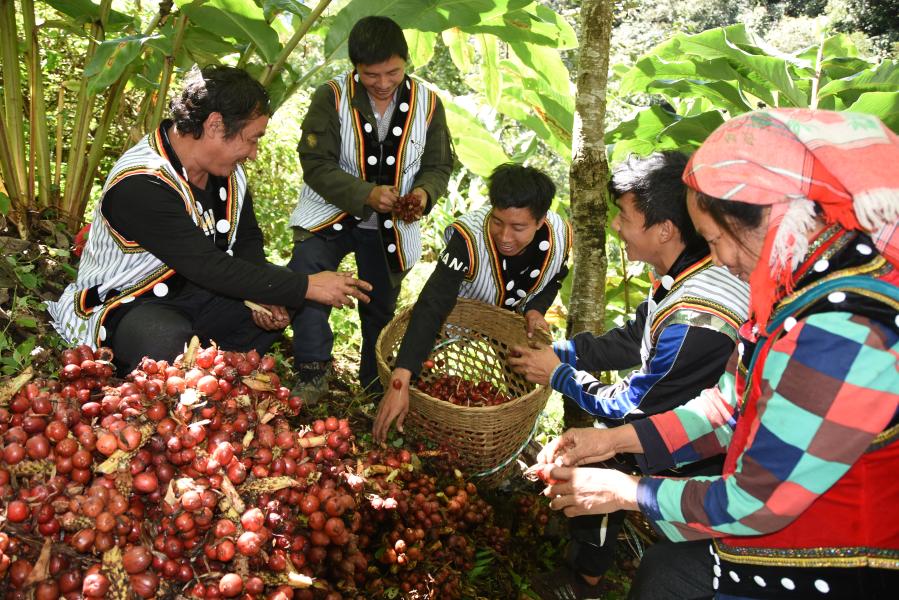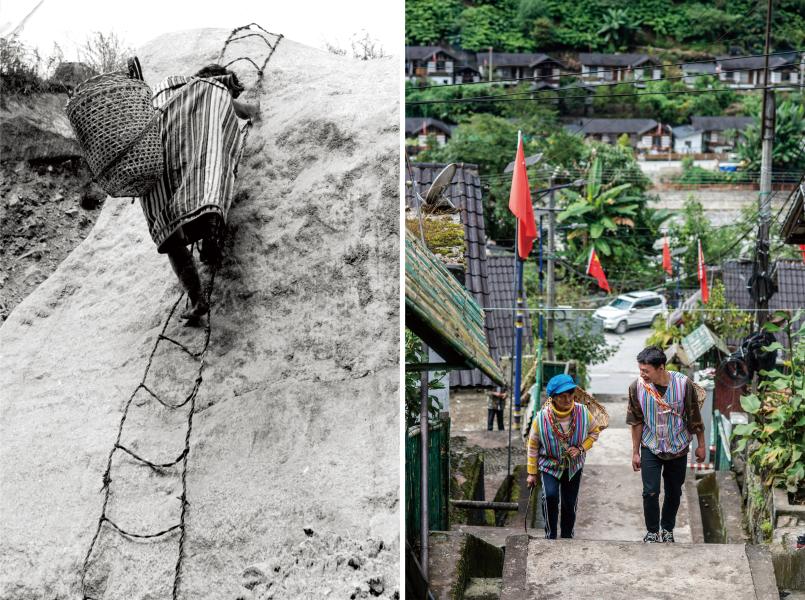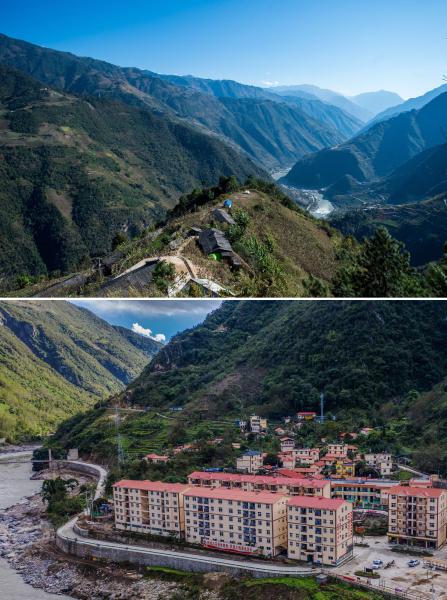China poverty reduction miracle in 'wrinkles of Earth'
More than half a million people living on the southwestern Chinese border have thrown off the shackles of poverty, their ancestors having long been isolated from the rest of the world.
More than half a million people living on the southwestern Chinese border have thrown off the shackles of poverty, their ancestors having long been isolated from the rest of the world.
The Nujiang Lisu Autonomous Prefecture in Yunnan Province sits in the Hengduan Mountains. Its fold ranges, dubbed the "wrinkles of the Earth," were shaped by the most intense plate movements on the planet.
The canyon area of the Nujiang River originating from the Qinghai-Tibet Plateau is one of China's poorest regions, home to those who make humble livings by farming the land with limited acreage. But now, it has been transformed thanks to a nationwide poverty-relief campaign.

Villagers harvest Amomum Tsao-ko in Fugong County of Lisu Autonomous Prefecture of Nujiang, southwest China's Yunnan Province, Oct. 28, 2019. (Xinhua)
BUILDING LIFELINES
He Xiaoyong, 41, is a member of the Dulong ethnic group, which has a small population of about 7,000, 60 percent of whom live in the Dulongjiang Township of Gongshan County.
In 1964, the local government opened a horse track across the neighboring Gaoligong Mountain, on which horse caravans carried food, salt and drugs to the secluded locality before the village was snowbound each year.
"It took us 12 days to go back and forth from our village to the county seat. It was difficult. We risked our lives during every trip as accidents like landslides, rolling stones or avalanches could occur at any time," said He.
In 1999, a simple road was built in Dulongjiang, and it was the first time that most Dulong people had seen an automobile. He sold his horses and purchased a tractor with savings he had collected for years, as horse caravans were no longer needed.

LEFT: This file photo taken before 1949 shows a man of Dulong ethnic group climbing a cliff-side ladder in Dulongjiang Township of Gongshan Dulong and Nu Autonomous County, southwest China's Yunnan Province.
RIGHT: Photo taken by Xinhua reporter Hu Chao on Oct. 31, 2020 shows Dulong villager Li Yongming accompanying his grandmother Dang Na as they climb up cement steps to harvest fodder grass from the mountains in Dulongjiang Township of Gongshan Dulong and Nu Autonomous County, southwest China's Yunnan Province. (Xinhua)
In 2014, a 6.68-km tunnel was dug through the mountain to allow year-round traffic.
The road became a lifeline, and it unveiled the long-hidden village to the world. He and his compatriots grasped the opportunity the road had created for them and opened homestays for tourists.
The lack of transport infrastructure had constrained the development of the Dulongjiang Township, and many more residents in the Nujiang prefecture had other difficulties to grapple with -- a harsh environment, dilapidated housing and poor infrastructure.
With the prefecture's poverty-relief efforts, more than 100,000 impoverished people were moved from deep in the mountains to urban areas, thus gaining access to better medical care, education, and living conditions.
New roads and new homes have paved the way for people in Nujiang to chase bolder dreams.

TOP: Undated file photo shows Dulong people crossing a rattan bridge in Dulongjiang Township of Gongshan Dulong and Nu Autonomous County, southwest China's Yunnan Province.
BOTTOM: Aerial photo taken by Xinhua reporter Hu Chao on Oct. 29, 2020 shows the newly-built Bailai Gan'en Bridge in Dulongjiang Township, Gongshan Dulong and Nu Autonomous County, southwest China's Yunnan Province. (Xinhua)
In late 2019, a scenic road was opened to traffic along the Nujiang River, spreading 288 km and linking most townships, relocation sites and tourist attractions in Nujiang.
The thoroughfare runs all the way to Tibet Autonomous Region, and the panoramic vistas along the road take tourists on a most impressive journey.
SOWING SEEDS FOR BETTER LIVES
Pu Luheng's family has grown corn for generations, but two years ago, he chose to plant Amomum Tsao-ko, a ginger-like Chinese herb that grows at high altitudes and is used as a seasoning spice.
Pu, from Yaping Village in Fugong County, remembers that corn was planted everywhere around his home when he was a child, even on the slopes of cliffs.
In canyons, the yield of corn per hectare is just over 1,500 kg, just enough to feed a family.
But opportunities came along when cadres sent from across the province to help with the village's poverty alleviation efforts offered the farmers some advice. They chose to plant Amomum Tsao-ko, and the government provided them with the seeds.

TOP: Photo taken on Nov. 25, 2016 shows a view of Tuoping Village in Fugong County, Lisu Autonomous Prefecture of Nujiang, southwest China's Yunnan Province.
BOTTOM: Aerial photo taken on Nov. 3, 2020 shows a view of a relocation site for villagers of Tuoping Village. (Xinhua/Hu Chao)
The crop, with a higher yield and economic value, proved to be a cash cow. With their earnings from the new industry, farmers were able to move from dilapidated homes to brick houses and have an extra meal each day.
Across Nujiang, the planting area for Amomum Tsao-ko and other spices has hit 96,000 hectares. In 2019, the per capita forestry income of farmers in Nujiang was nearly 3,000 yuan (462.9 U.S. dollars), accounting for more than 40 percent of their per capita disposable income.
Despite its hardships, the prefecture is actively seeking a way out of poverty, using technological approaches to develop modern agriculture.
In the Laowo Township, an orange orchard equipped with an intelligent drip irrigation system was built in 2019. The orchard, covering over 20 hectares, is managed by an orange-planting cooperative co-founded by 132 poor households.

Women work at a poverty relief workshop of a relocation site in Fugong County of Lisu Autonomous Prefecture of Nujiang, southwest China's Yunnan Province, Nov. 2, 2020. (Xinhua/Hu Chao)
Li Jinxue, a researcher from the Yunnan Academy of Agricultural Sciences who also works as a poverty-relief cadre in the township, found that the local climate was suitable for growing oranges, but it was difficult to generate benefits due to a lack of scientific management and technologies.
Li introduced a smartphone-controlled drip irrigation system that can reduce human input and save water and fertilizer. "Now irrigation can be completed with just a few clicks on a screen. In the past, even for 10 people, land had to be watered for five or six days.
Local farmer Liu Heping said he has leased his land -- less than 1 hectare -- to the cooperative for an annual rent of 9,000 yuan, and earns 2,600 yuan a month as vice president of the cooperative. He used to work in a brickyard and earned 100 yuan per day.
"We just sowed the seeds of intelligent agriculture and allowed them to take root and sprout," said Li.

